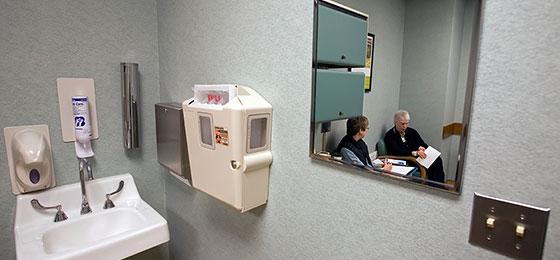Putting patients first

Clinical research costs a lot of money. New financing models are needed to answer questions that are of importance to patients, but that are of lesser economic interest. By Oliver Klaffke
(From "Horizons" no. 106, September)
Picture: © Keystone / Science Photo Library / Jim West
The pharmaceutical industry likes to invest in the development of profitable drugs. However, wealthy investors are lacking when it comes to researching new forms of treatment. “Studies that focus on the patients, not commercial interests, still play an important role in improving the treatment and care of the sick”, says Stephanie Tan. She’s a doctor who works for Quintiles Asia, a company that carries out clinical trials. Early in 2015, Tan and her colleagues published a handbook for clinical studies set up by researchers, appropriately titled Investigator Initiated Trials Made Easy. Such studies have been on the rise since the mid-1990s. In these cases, medics choose their research topics independent of economic interests.
A new, special SNSF programme is now offering funding to help realise independent studies in Switzerland: ‘Investigator initiated clinical trials’. There will be two bidding rounds offering CHF 10 million each, which will suffice for four or five studies. “We would like to encourage researchers to carry out clinical studies on issues that they think are relevant”, says Ayşim Yılmaz, the head of the Biology and Medicine Division of the SNSF. The type of therapy involved and the illness to be investigated are of no consequence whatever. The design and quality of the project alone will decide whether the study gets the go-ahead or not. “It’s a bottom-up approach”, she says. This is what distinguishes the SNSF programme from those of other European countries or the USA, where investigator-initiated studies are also given special funding, but in general only when the topic has been decided in advance.
Money from the industry
"In Italy, where I work, such research is funded by the AIFA Fund of the national medicines approval authority”, says Giuseppe Traversa of the public Istituto Superiore di Sanità in Rome. The Italian programme is financed by a fee that the pharmaceutical industry has to pay, equivalent to 5% of their marketing expenses flowing into independent clinical research. This means that some EUR 40 million are available every year for research topics such as drugs for rare diseases or comparisons between different treatment strategies. As Traversa wrote in an article in Annals of Oncology, a specialist journal for cancer research, this kind of funding is an opportunity that you have to grasp with both hands.
Viviana Muñoz from EPFL proposes financial support from foundations. Along with the researchers of the Chair of Economics and Management of Innovation at EPFL, she believes that philanthropic funding has proven itself worthwhile in fields that are not economically lucrative, such as tropical diseases or the use of off-patent generic pharmaceuticals.
One such example is the aid organisation Doctors without Borders. It invested the money from its 1999 Nobel Peace Prize, and in collaboration with five other organisations used it to help set up a foundation in Geneva called the Drugs for Neglected Diseases initiative (DNDi). In 2013 DNDi had a budget of CHF 30 million, of which half came from private patrons, and it fills a gap in the development of drugs. Together with industrial partners, it produces drugs for weak markets that help to combat diseases such as leishmaniasis, malaria and HIV in children. Such sources of income are essential if we are to make clinical progress in niche areas that are not economically lucrative but medicinally important.